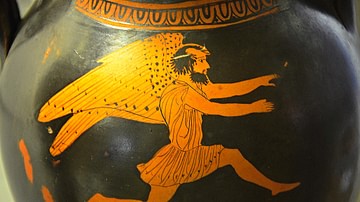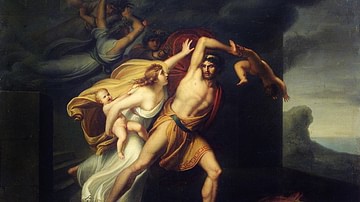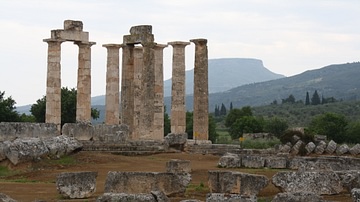Search
Did you mean: Horace?
Search Results

Definition
Boreas
Boreas is the god of the violent North Wind in Greek mythology. He is the son of the Titan Astraeus and Eos, the goddess of the dawn, and brother to Zephyrus (the West Wind) and Notus (the South Wind). He is best known for his bad temper...

Definition
Amphictyonic League
The Amphictyonic League was an early form of religious council in ancient Greece. It was typically composed of delegates from several tribes or ethnes living in the vicinity of a major, prosperous sanctuary, who then collaborated in supervising...

Definition
Oedipus at Colonus
Oedipus at Colonus was the third play of the Oedipus trilogy written by the great Greek tragedian Sophocles (c. 496 - c. 406 BCE). Although written in the years prior to his death, it would finally be presented by his son Iophon at a dramatic...

Definition
Ino
Ino is a princess of Thebes and the wife of King Athamas of Boeotia in Greek mythology. She helped to raise Dionysos, the god of wine, but the most famous myth associated with her is her descent into madness and the tragic fate of her family...

Definition
Nemea
Nemea was a religious sanctuary in the northern Peloponnese of Greece where pan-Hellenic athletic games were held every two years from 573 BCE until 271 BCE, after which, the Games were definitively moved to Argos. Early Settlement Situated...

Definition
Andromache
Andromache is a Greek tragedy written by Euripides (c. 484-407 BCE), one of only 19 plays (out of 92) to survive. The play is actually in two parts, and like Sophocles' Women of Trachis, it has no central character. The first part of the...

Definition
Women of Trachis
Women of Trachis is a Greek tragedy, one of Sophocles' (c. 496 BCE - c. 406 BCE) lesser-known works, the only one that does not deal with the aftermath of the Trojan War, rather it is concerned with the death of the Greek hero Heracles (or...

Definition
Cyclops (Play)
The satyr-play The Cyclops was written by Euripides, one of the great Greek tragedians, in 412 or 408 BCE. Like many of his fellow tragedians, Euripides centers his play on a well-known story from Greek mythology. The Cyclops is based on...

Video
The Greek God Apollo: The Myths of the Olympian God of Music, Medicine, the Sun and Archery
The god Apollo in Greek mythology is the Olympian god of, well, quite a lot! Apollo is associated with the bow, music, divination, the sun, poetry, healing and medicine and, who would have thought, plagues. He was one of the most loved gods...

Image
The Twelve Labours of Herakles
A map illustrating the Twelve Labours of Herakles (Heracles, romanized as Hercules), probably the most famous of the ancient heroes in Greek mythology. Born as a demi-god (son of Zeus and the mortal Alcmene,) Herakles was tricked out of his...